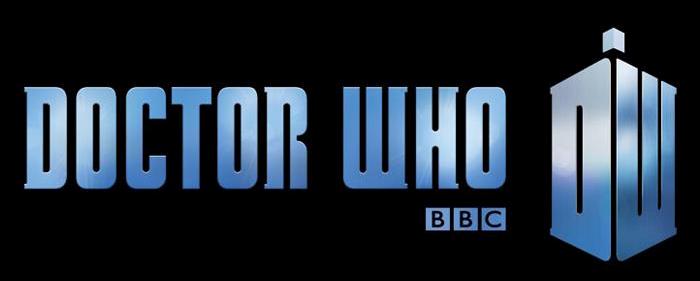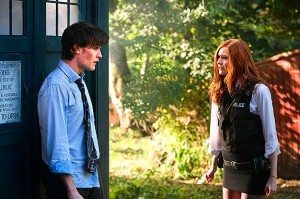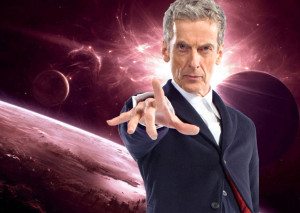Smaller On The Outside
The first series of the reborn Who was a great triumph for British television. The writing was tight, it was incredibly fitting to the time – I look at it and think 2005, in the same way series one of Friends says 1994 – and the characters were brilliant. Christopher Eccleston’s Ninth Doctor had everything: flippant yet responsible, mature yet fun, well-meaning and merciful. The Tennant years then sculpted the show into something darker, leaving a televisual behemoth in Steven Moffat’s hands.
Under showrunner Russell T Davies (RTD), Moffat’s stories were among the most ambitious, most imaginative and often pushed boundaries. ‘The Empty Child’/’The Doctor Dances’ is widely regarded as the best story in the first series of new Who. It succeeds in its entertainment with a chilling adversary, moral ambiguity everywhere and the ambitious setting of World War Two – something which sadly has since featured all too often: exactly how many Doctors are in London in 1943?
‘Blink’ is even better. It develops like a good horror film – think Alien – breaking the tired format of arrival, intrigue, threat, complication, ethical dilemma, minor character death, timelord fury and love-conquers-all resolution. Why, then, is Moffat’s tenure more formulaic than the RTD years?
The apparent audience of the show seems to be getting younger, too. With the exception of the Slitheen’s farts, the family show’s tone didn’t often aim for juvenility in the RTD era. ‘Waters of Mars’ is so adult that it encroaches on Torchwood‘s territory, however the obnoxiously titled season seven romp ‘Dinosaurs On A Spaceship’ feels like an attempt to sell merchandise Jar Jar Binks-style and better belongs on Cbeebies than BBC1. Indeed, it seems to have inspired the most recent addition to the Transformers franchise.
The fanbase of Doctor Who is a loyal one, but one that expects a level of respect. It is a fanbase that wants to be treated as intelligent and as worthy of having an input into its adored show. Matt Smith’s maiden voyage as the Eleventh Doctor was ultimately well-received, with critics commenting on the cooler, lighter tone of ‘The Eleventh Hour’. As the series continued, the opinion was that post-RTD, the show could go on.
The show stayed on track with guest appearances from Dumbledore and Katherine Jenkins at Christmas, and imaginative episodes like ‘The Doctor’s Wife’. The decision to split the series into two-parts, however, was met with a lot of contention in the general online conversation.
By that mid-season hiatus, the backlash against simple plots, love-will-save-the-day resolutions and overly ambitious story arcs that are never resolved – maybe Moffat really liked Lost – hit an all-time-high and Moffat’s Twitter handle became a target for criticism, not all of which was without constructive advice.
When you’re in charge of the BBC’s biggest show – it’s either Sherlock or Doctor Who, so Moffat actually has gold and silver however you look at it – surely your job involves listening to public opinion. Moffat should have responded constructively.
Instead, he decided to alienate everyone who even attempts to discuss his show online by openly attacking Twitter in later episodes and even more cringingly making WiFi a villain in a sure-fire way to show just how little science the supposed king of primetime sci-fi understands.
Ever since the subsequent Christmas special which appeared to be an Outnumbered spinoff, the show has been an exercise in recycling plots and neglecting to include strong female characters.
Limping past Clara who amazed audiences with her ability to die at least twice in lieu of a personality, the show came to its 50th anniversary episode. Thankfully, Moffat produced a fantastic episode which stands alone as well as it fits into the canon. It even resets the canon somewhat, in a Days of Future Past or Crisis On Infinite Earths kind of way.
Peter Capaldi promises to be a much more naturally fierce Doctor than Smith or even Tennant, closer to Eccleston or John Hurt’s War Doctor in his inherent physical scariness.
The Eleventh Doctor always seemed to compensate for his boyishness in being downright cruel and maleficent in weekly displays of self-righteous bullying. With Capaldi’s much less friendly face, I assume Moffat will juxtapose a more benevolent demeanour.
In the same way, past Doctors have had trajectories from killer to coward – and Smith did this in a sort-of reverse – Capaldi will hopefully bring the show back to following a likeable renegade timelord, not a wildly unsettlingly babyfaced arrogant god.
We’ve also had confirmation from both Capaldi and Moffat that Twelve will not be flirting with his companions, taking a step in the right direction following the crassness of a 1000-year age difference between Clara and her time-travelling stalker.
“I’m 2000 years old,” admits the Doctor in the season trailer, which for the record means the Eleventh Doctor represents the majority of the Doctor’s life so far. “I’ve made a lot of mistakes. It’s time I did something about that.” Damn right, Doc, but with yet another return to Victorian London with yet more dinosaurs adding yet more terrible CGI to the Who canon in feature-length season opener “Deep Breath”, I’m holding mine.
The next Doctor Who episode “Deep Breath” airs Saturday 23rd August on BBC One and is the first full story to feature Peter Capaldi as the Twelfth Doctor.



Comments